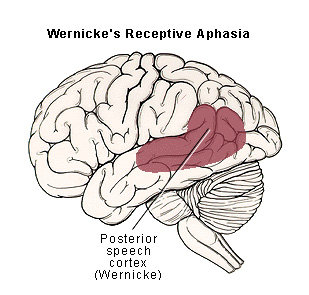Wernicke's aphasia
From Psy3241
Wernicke's aphasia (also known as fluent aphasia) is a type of aphasia in which significant damage has been done to Wernicke's area in the posterior superior temporal gyrus of a person's dominant hemisphere. It was first discovered by Carl Wernicke and knowledge was significantly advanced by Norman Geschwind. Patients with this type of aphasia experience tremendous speech difficulties, often speaking unintelligibly, adding or replacing words. They often have great difficulty understanding speech as well. Spontaneous recovery is possible, when the aphasia results from a stroke cutting off blood flow to a certain part of the brain, though it does not happen in most cases. The only current treatment is speech therapy, with the hope of improving understanding of speech.

